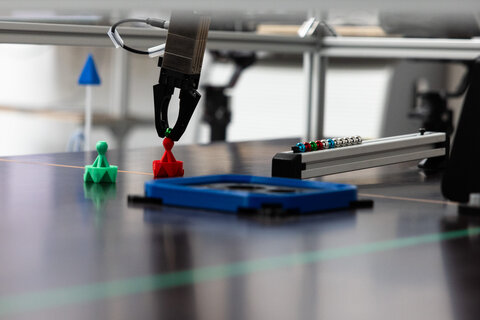The topics of the future in mechanical engineering - your springboard
Choosing the right materials. Coatings. Hybrid lightweight construction. Are these the topics that already fascinated you during your bachelor's degree? You can specialise further here, for example in the use of multi-axis robots, automation or management skills.
Programme content and structure
Entry requirements
Entry requirements for an application for APE are:
- University entrance qualification
- Bachelor's degree in engineering or natural sciences
- Good proficiency in German and English (at least CEFR B2)
- APE Admission regulations (in German)
Special features
Internships are very important to us, and research and project work is an integral part of our teaching.
We are embedded in a diverse industrial landscape of successful medium-sized companies with the following product portfolio:
- the automotive sector
- medical technology
- machine tools
This master's degree course is unique in Europe due to its innovative character.
Admission to part-time study is possible and strongly encouraged.
Strong partners
We work together with strong industry partners in our APE Master's programme.
Download file:Click here for an overview
Your career prospects
Those who have completed the master's degree programme in Advanced Precision Engineering have ideal opportunities for personal development in the various fields of mechanical engineering and the manufacturing industry. Graduates can comfortably secure roles in development and research, sales, product management and management.
Possible fields of work are: Research and development, design, production, quality assurance, testing and inspection, project management, technical sales, technical management. In particular in the fields of mechanical and plant engineering, automotive and vehicle construction, the manufacturing industry (production of technically sophisticated high-precision system components, products, machines and systems), measurement and testing technology, ultra-precision technology and new technologies/inventions and patents, as well as in external development teams and committees at colleges, universities and research institutes.
Areas of specialisation
After studying Advanced Precision Engineering, you can specialise in one of these areas, for example: Precision technology, manufacturing, applications and processes, development of production systems, machine tools, robot systems and automation systems - in particular machines and systems for future ultra-precision machining, development for new tool technologies, for materials technology, coating processes and surface technology, in the field of sensor technology for drive, control and regulation technology. You can work in quality assurance and metrology, in the field of hybrid and innovative materials, plastics technology, but also in quotations and work preparation. All options are open to you.
Events
Further dates and eventsUnfortunately, there are currently no events planned that we can display here. We have compiled an overview of all planned events in the event calendar.
Your key contacts
Your future is important to us. Contact us for advice.


